We are happy to see you here in another blog article, where we will talk about what are the keywords or key words in Google, and what importance they have in the organic ranking.
As you well know, already in other articles we will explain to you how to do a keyword research with different tools, and what is the practical application of these keywords on a web, as inserted for example in the meta tags.
Definition of keywords or keywords
If you are looking for are keywords or key words, you've come to the right place. First, we must tell you that when we talk about both of keywords (in English) key words (in Spanish), we always refer to the same concept.
But what is it? The keywords are the words that users use to search for something on the internet (Google, Youtube, social Networks, other search engines...). So, when a user does a search on Google (for example), the giant american explores all those web pages that have the keyword or keywords that this user has typed into the search engine, to then return all results that fit with this word (i.e., that have the word on their website).
How to find the best keywords step-by-step?
Well, knowing that we will have to include all those keywords that users search for Google to show us your results, now it's time to know how to extract those key words to be able to incorporate in our content.
Step 1: Suggestions from Google
The first step of all, as I explained in the article where I teach you how to do a keyword research step by step, is to use the same Google search engine in order to extract all of those ideas or suggestions to include in our article.
This is important, because if we clear the main key word or idea that is going to treat the article (e.g.: parking in Barcelona), we can extract additional suggestions of how people are searching for that keyword.
If for example you want to position a page for the main keywords of “parking in Barcelona”, by using this technique, we will be able to find what they are asking users about the concept of “parking in Barcelona”:
- Parking in Barcelona center.
- Parking in Barcelona rental.
- Parking in Barcelona to buy
- Parking in Barcelona on the cheap.
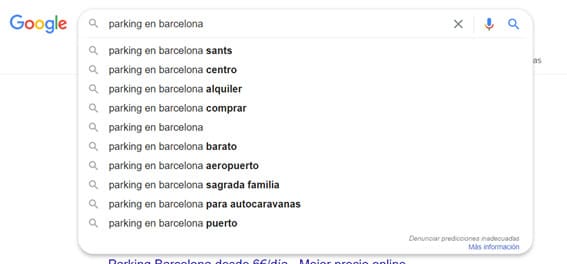
All of these suggestions that Google displays, are arranged from highest to lowest search, and if the seeker the offers, it is because users have searched for.
Step 2: Planner keyword or Keyword Planner Google
Once we have already collected a few ideas with the suggestions of Google, it is time to include these keywords in the planner Google keywordin order to detect the searches monthly, and be able to extract more ideas and keywords.
If we continue with the example of “parking in Barcelona”, with this free tool from Google called keyword planner, we will be able to find that users also use the terms or keywords below to find the same product or service:
- Parking in Barcelona.
- Parking in Barcelona.
- Park in Barcelona.
About the role are different words, but in practice all have the same search intent.
Other tools to do your keyword research:
- Answer the public: As we have explained already in the previous articles, this tool is great for finding keywords longtail or long tail. Let's remember that this type of words are perfect to attract quality traffic, because the have less searches, the search for a more niche, and therefore a type of user that you know very well what you are looking for. This tool is also suitable to find faqs to include the rich snippet of FAQ's to post in our website.
- Keywordtool.io: This second tool for finding keywords, it is free for home use, but if you want to use it in a way more professional, we will have to pay to be able to access to view the monthly searches for each keyword. What are the advantages of this tool? We have the keywords targeted to each platform, web or social network. That is to say, we can search for the keywords that position in Google, Youtube, Bing, Amazon, Play Store (recommended for the positioning ASO or search for APPs, Instagram...).
- Ubersuggest by Neil Patel: Finally, we recommend you this latest tool to do your keyword research, created by Neil Patel, even in the free version you will have only 3 or 4 attempts to search for key words, before I make you pay. Even so, will allow us to carry out different tasks such as:
- Search for key words.
- Analyze the health SEO of our website.
- Detect Domain Authority of other websites.
- And much more!
- Keywords Everywhere: This is not a website or a platform as such, but rather a Chrome extension. We are going to come very well to get keyword ideas or suggestions in the first phase of our keyword research. The operation is as follows: once you have installed the extension, it will be as easy as searching the keywords in the search box of Google, and we'll see as the right-hand side will open up different columns with various suggestions of keywords associated with the main word that you have entered in the search engine. In addition, we will be able to enjoy downloading these key words in excel format, so that we can analyze with more calm.
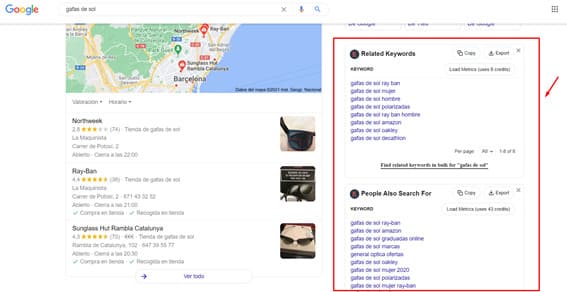
Step 3: Analyze the keywords in the competition
This is, perhaps, one of the most important points to find keywords, as there are specific tools to detect why keywords are positioning the competition in the first results.
To do this, we will use the two main platforms to extract these keywords:
The procedure is as follows:
1. We make the search for the key word for which you want to position in Google.
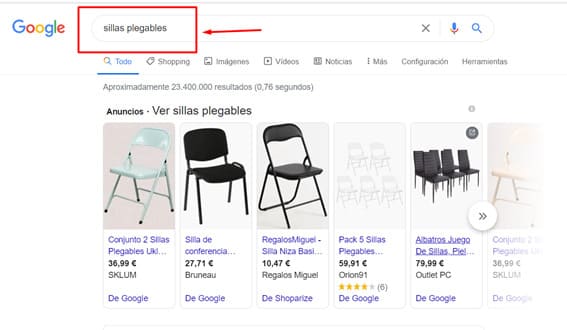
2. We take the urls of the 3 or 4 first ORGANIC results or SEO that are positioning themselves better for that keyword.
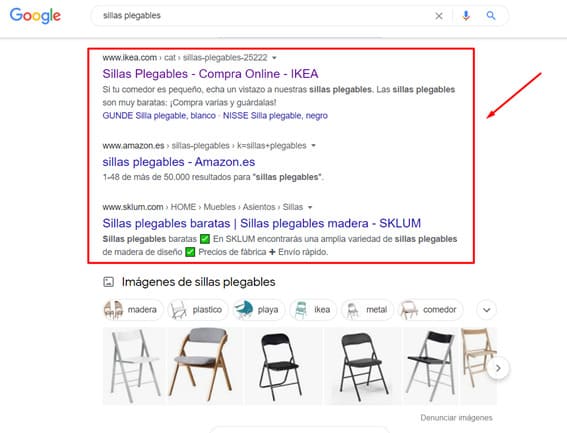
3. Access to any of the two platforms, and insert each one of those urls.

4.We find the keywords for which it is ranking.
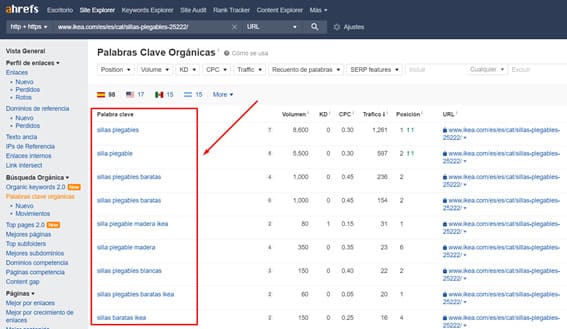
5.Finally, we include these keywords in our content.

